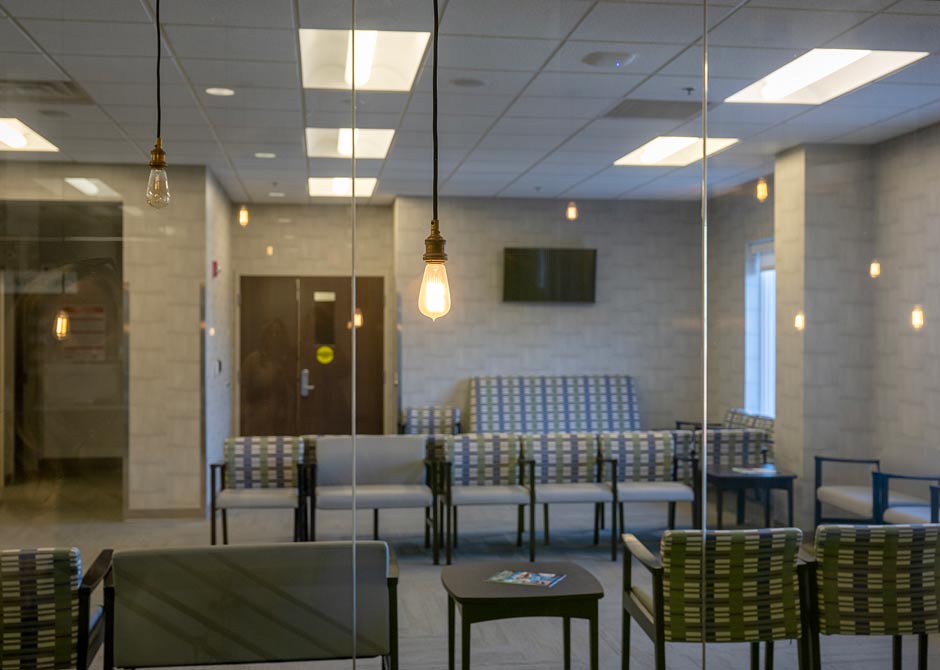 If you suffer from depression, anxiety or another mental or behavioral health condition, it can be difficult to decide to seek professional help. It can be equally challenging to know who to turn to for that help.
If you suffer from depression, anxiety or another mental or behavioral health condition, it can be difficult to decide to seek professional help. It can be equally challenging to know who to turn to for that help.
The mental and behavioral experts at The Ohio State University Wexner Medical Center in Columbus, Ohio, understand it can be intimidating to access any type of mental health care, but we want you to know that meeting with us is no different than meeting with your primary care physician or another medical specialist. Mental health is an important part of your health care.
At the Ohio State Wexner Medical Center, we strive to provide compassionate, evidence-based care, and we work diligently to determine what course of treatment will work best for you. We aim to make it easy to access care and to provide the right type of care based on your needs. For many people, outpatient mental health services provide the best environment to get better.
What is outpatient mental health care?
Outpatient mental health care isn’t a specific treatment but a group of treatments that happen in a provider’s office, an ambulatory care center or hospital.
It’s not for people whose condition requires an overnight stay, detoxification or around-the-clock care, such as what is offered in our inpatient and residential mental health programs.
Outpatient care typically begins with an initial psychiatric evaluation to determine a diagnosis. During the evaluation, your provider will ask about your current symptoms, family history and any medical conditions as well as learn more about your daily life and what is important to you. The provider will then provide you with a list of treatment options known to be beneficial to individuals with similar concerns.
Types of outpatient mental health care available at Ohio State
At the Ohio State Wexner Medical Center, we provide evidence-based, trauma-informed outpatient mental health care that includes psychotherapy (talk therapy), medication management and interventional psychiatry methods for more difficult-to-treat conditions.
Types of outpatient treatment include:
- Individual psychotherapy
- Group psychotherapy, including for people with a substance use disorder
- Medication management
- Transcranial magnetic stimulation (TMS)
- Electroconvulsive therapy (ECT)
- Ketamine therapy
- Partial hospitalization (PHP) or intensive outpatient (IOP) programs
- Specialized programs, such as the Early Psychosis Intervention Center (EPICENTER) or the Suicide and Trauma Reduction Initiative (STRIVE)
Providers you might see during outpatient mental health care:
- Psychiatrist: a medical doctor who specializes in diagnosing and treating mental illness, including prescribing medications.
- Psychologist: someone with doctoral-level training in psychology who diagnoses and treats mental illness and provides psychotherapy.
- Psychotherapist: a licensed independent social worker or licensed professional clinical counselor who has a master’s degree and is trained in diagnosing and treating mental illness, as well as case management. Psychotherapists, like psychologists, can help people identify goals, problem solve, improve coping skills, foster self-esteem and promote behavior change.
- Psychiatric nurse practitioner: someone with specialized training in mental health who, depending on certification, can evaluate for mental illness and provide psychotherapy.
 Is inpatient or outpatient care better?
Is inpatient or outpatient care better?
Treatment is not one size fits all. Neither type of treatment is better than the other. We create an individualized treatment plan based on the individual’s needs and will recommend a plan that we believe would be most beneficial to you based on the condition you have, its severity and several other factors. Each type of treatment has different benefits and drawbacks, so it’s important to discuss with your mental health provider which one is best for you.
Who is outpatient mental care for?
We offer specialized outpatient services for a variety of mental health conditions, including:
- Depression
- Bipolar disorder
- Anxiety disorders
- Obsessive-compulsive disorder
- ADHD
- Psychosis and psychotic disorders
- Schizophrenia
- Personality disorders
- Women’s behavioral health, including sexual dysfunction
- Trauma and post-traumatic stress disorder
- Substance use disorder
How do I access outpatient mental health care at Ohio State?
There are several different ways you can access outpatient mental health services at Ohio State. Those access points include:
Self-referral
If you’re concerned about your symptoms or have a diagnosed mental health condition, you can refer yourself to outpatient care. When you call 614-293-9600, the person on the phone will ask you about the problem you are seeking help for, any current diagnoses, and whether you are interested in being linked with a provider who offers medication management or psychotherapy. Then, we’ll make an appointment with the most appropriate provider. If you don’t know the answers to those questions, our scheduling team will offer you an appointment with the first available provider.
Physician referral
You can also talk to your primary care physician or specialist if you think you have depression, anxiety or other mental health condition. Your provider can then provide advice, offer treatment if appropriate or refer you for care either in our clinics or in another agency in your community.
Psychiatric emergency services
If you go to our emergency department with psychiatric symptoms, you’ll be evaluated by a special team of mental health providers, who are embedded in our emergency department. If they think outpatient mental health care is the best option for treatment, they will provide appropriate referrals.
Behavioral Health Urgent Care
Our clinic can help when you’re experiencing worrisome symptoms but can’t get in to see an outpatient provider right away. If you visit the clinic, we can bridge the gap by providing outpatient services, like medication management and psychotherapy, and we can help expedite seeing an outpatient provider.
Why choose Ohio State for outpatient mental health care
The Ohio State Wexner Medical Center is a leader in providing mental health care to those in central Ohio and beyond. We have many different ways to serve your outpatient needs, and we do it conveniently and efficiently to help you feel better faster.
Here are some key differentiators in our outpatient program:
- Capacity – We are always accepting new patients into our care and strive to schedule new patients as quickly as possible. We offer outpatient services at numerous locations throughout central Ohio and via telehealth, so it’s possible to receive care close to or at home.
- Evidence-based therapies – We focus on offering treatments that work. The care we provide follows best practices based on years of research and evidence of what works the best and the quickest.
- Full continuum of services – While we have a full range of outpatient services, we also offer inpatient care, intensive outpatient options and crisis management if your condition and symptoms require more acute care.
- Care for treatment-resistant conditions – Some patients do not improve with traditional treatments. If psychotherapy and medications don’t work as well or as quickly as we would expect, we have various other forms of therapy available. These treatments are not widely available outside of academic medical centers. For instance, we offer interventional psychiatry services, such as transcranial magnetic stimulation and ketamine therapy, through our Depression Recovery Center.
- Latest innovations and research – We are dedicated to improving behavioral health care for patients. As part of an academic medical center, our experts have a strong commitment to researching new and innovative ways to prevent, diagnose and treat mental health conditions.
